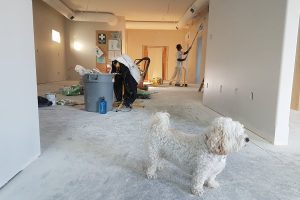The ABCs of Implied Warranty of Habitability

When it comes to residential leases, there is this concept called “implied warranty of habitability”. It means that the law automatically assumes and mandates that a property marketed for lease is fit and suitable to live in and will stay that way throughout the lease.
For a property to be qualified as habitable, particular standards must be met.
How powerful is this warranty? At the core, it can impact the property owner or the landlord’s obligations and the tenant’s rights. Thus, if the law of the state you live in recognizes the implied warranty of habitability, if you are a landlord, you are required to keep your property habitable.
The implied warranty of habitability may also derive from building codes and may have a minimum requirement related to services like heat, water, and plumbing. Moreover, the warranty may mandate landlords and tenants to meet additional standards so that a home is qualified to be called a safe and decent place.
Typically, however, the warranty only applies to apartments, units, houses, and other property used for living purposes. In other words, commercial properties for lease are not subject to meet the warranty’s conditions.
Conditions and Breaches Acknowledged Under the Implied Warranty of Habitability
The law of most states recognizes conditions that are classified as a violation of the implied warranty of habitability. This includes:
- If the property for lease or rent has no hot or drinkable water;
- If there is no access to heat during cold weather;
- If the property for lease or rent has no electricity supply;
- If the property for lease or rent has no pre-installed smoke detector/s;
- If the property for lease or rent’s bathroom or toilet are not working or there are no bathrooms or toilet at all;
- If the landlord does not act on sanitary needs, like on the removal of rodent or insect infestation; and,
- If building codes are violated.
Meanwhile, even during the course of the lease where the property has already met the requirements of the implied warranty of habitability, the warranty still requires that the property must not have health and safety hazards. On that note, the following conditions are considered hazardous and are considered breaches of the warranty:
- Fire Safety Issues;
- Electrical Problems;
- Gas Leaks;
- Lead Paint Usage, unless the tenant is properly informed about it;
- Water Flooding or Damage;
- Serious Plumbing Problems;
- Unreliable Water Heaters and Furnaces;
- Unsafe Ventilation;
- Dust or Mold Contamination;
- Rodent or Insect Infestations;
- Unreasonable noise;
- Unstable roofs and other structure;
- Dangerous Renovation;
- Insufficient Locks or Lack of Security Measures;
- Loose Plasters;
- Faulty Windows and Dangerous Railings; and,
- Unsanitary Conditions
Depending on the law of the state, the landlord may be required to immediately fix or address the abovementioned breaches. But in most states, the court decides on the requirements that the landlord has to comply with to obtain an implied warranty of habitability. Hence, in this case, meeting housing codes is somehow irrelevant.
Leases Under the Implied Warranty of Habitability and the Legal Remedies
The implied warranty of habitability only applies to residential leases and not to commercial ones. Generally, residential properties put for lease or rent include houses, apartments, and other kinds of dwellings rented to be lived in. However, condominiums are an exception.
If the landlord fails to meet the requirements stipulated in the implied warranty of habitability, the law entitles him ample time to fix the problem, i.e. the tenant must inform about the problem and give the landlord reasonable time to address it. However, if the landlord’s lack of action continues, then a breach of the warranty is implied. When this happens, as a tenant in Los Angeles, you can opt for these legal actions with the help of a Los Angeles tenant attorney:
- Withhold the rent payment with the breach of the warranty as a justification; Generally, as a tenant, as long as you are still living in the property, you cannot stop paying the rent but with the right tenant lawyer in Los Angeles, the breach of the warranty will suffice to justify your act.
- Have the repairs done and deduct the total expense from the rent;
- File a lawsuit for damages. Depending on the state’s jurisdiction, this might include repair reimbursement, rent refund, punitive damages, compensation for emotional distress and personal injury, and termination of the lease;
- File a lawsuit to force the landlord to act on the repairs. As a tenant, you can seek a court order that will force your landlord to make the repairs. However, courts are less likely to use this option because of its costly nature.
- Withhold the rent payment and vacate the area; and/or,
- Use other remedies stipulated under the lease.
Other FAQs about the Implied Warranty of Habitability
FAQ #1: Can the warranty be waived?
As a general rule, the implied warranty of habitability cannot be waived. Moreover, the court can void the lease provisions that are not consistent with the premise that the place is habitable. Hence, if you rent an apartment ‘as I’s, the warranty may be violated.
FAQ #2: What should be done if a breach of the warranty exists?
If any of the abovementioned breaches of the warranty exists, the landlord has the right to be notified immediately and be given a reasonable time for the repair. As per the law, the reasonable time of repair must not go beyond 30 days unless the nature of defect requires a major renovation.
FAQ #3: What happens to the landlord in case he fails to comply with the implied warranty of habitability?
At the core, landlords are required to keep their property livable and habitable. That is even if the lease contract does not specifically mandate that the needed repairs be acted upon immediately. Because of this clause, tenants more often than not easily force their landlords to make the repairs.
FAQ #4: Do I need to consult a tenant lawyer to look into my habitability case?
Definitely. As the landlord-tenant law is very complex, you will need a seasoned tenant attorney in Los Angeles so that you will fully understand the ABCs of your state’s implied warranty of habitability. If need be, your lawyer will also represent you in court.






